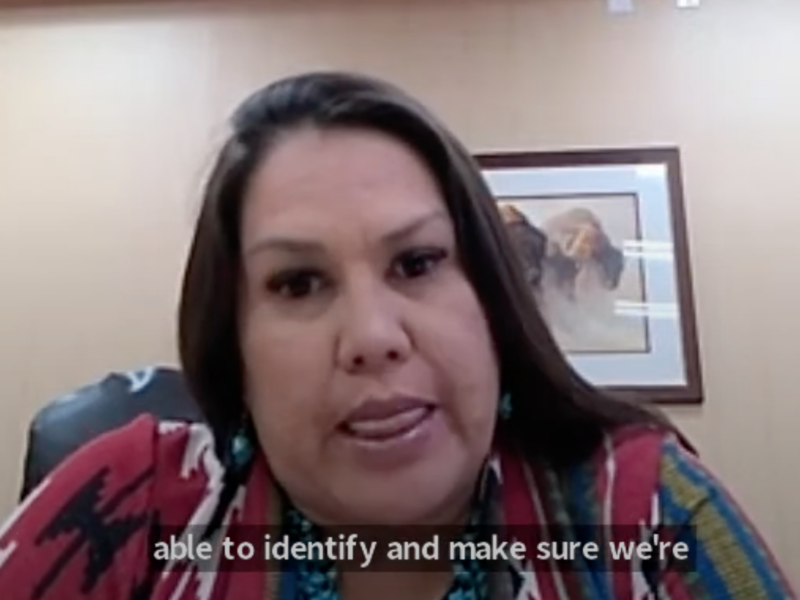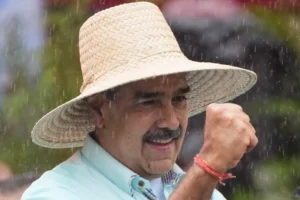Lawmakers to Deliberate Mandating Providers to Ask about Native American Ancestry of Relinquished Children
Proposed bill applies to newborns dropped off at safe havens
- Published In: Politics
- Last Updated: Nov 16, 2023

Pictured here is Vernalyn Bearing, director of the Eastern Shoshone Department of Family Services and a member of the Indian Child Welfare Act Task Force. (Courtesy photo from the Nov. 6, 2023 ICWA Task Force meeting via Wyoming Legislature’s YouTube channel)
By Shen Wu Tan
Special to the Wyoming Truth
State legislators will consider a bill on Thursday that amends an existing law to require safe haven providers to find out whether relinquished newborns have any Native American ancestry and, if they do, mandate courts and other parties to comply with the Indian Child Welfare Act (ICWA).
The Select Committee on Tribal Relations will receive an update about the bill from the ICWA Task Force. Last week, the task force unanimously approved the proposed amendments, which would apply to infants 14 days or younger who have been turned over to a safe haven provider, such as a fire station or hospital. The legislation would revise a federal act intended to prioritize placement of Native American children with other Native families.
Vernalyn Bearing, director of the Eastern Shoshone Department of Family Services and a task force member, noted the main concern is identification to make sure “we’re not losing any children in that gap for that identification for either tribe,” referring to Wyoming’s Northern Arapaho and Eastern Shoshone Tribes.
“Once identification is made, then the tribes would move forward in the services,” she said at last week’s task force meeting.
The bill, titled Indian Child Welfare Act-safe haven amendments, mandates safe haven providers request information to determine the child’s possible tribe affiliation. But it’s not required for the person dropping off the child to offer information to the provider or for that individual to express an intent to take back the child.
“With respect to requiring that kind of information, the majority of other states, their safe haven laws are kind of silent,” David Hopkinson, a staff attorney for Wyoming’s Legislative Service Office, told the task force. “Most of them don’t mention ICWA or specifically address ICWA requirements.”
Wyoming passed its safe haven law in 2003. The act allows parents to surrender their child to a police department or sheriff’s office, hospital, fire department or other place of shelter, therefore, relinquishing their parental rights. If a parent does not reclaim the child within three months, then the child will be put up for adoption.
History of ICWA
The ICWA task force voted to remove language from the bill that stated a parent or parent’s designee may refuse to answer questions about a child’s tribal affiliation or Native American ancestry.
Karen Returns to War, co-chairperson of the Northern Arapaho Tribe Business Council and another task force member, spoke out against that language, arguing it doesn’t align with the intention of ICWA.
“I hope that we’re all thinking…about our Native children here within the state of Wyoming,” she said. “All of it goes back to taking our children, trying to colonize them, and this is not what we want…. These are our children. We are more than capable of taking care of them.”
Under the current version of the bill, the provisions would go into effect by July 1, 2024 if approved.
In June, the U.S. Supreme Court ruled to uphold ICWA although the state of Texas, a birth mother and foster and adoptive parents questioned the law’s constitutionality.
ICWA provides guidance for cases of child abuse, neglect and adoption involving Native American children. Under ICWA, a tribal court has exclusive jurisdiction over all child custody proceedings, including adoptions and foster care placements, when a Native American child lives on a reservation. State and tribal courts exercise “concurrent jurisdiction” for other Native American youth, but the state court is sometimes required to transfer the case to tribal court.
Research has found that state child welfare and private adoption agencies removed an estimated 25% to 35% of all Native American children from their homes. Of those, roughly 85% were placed outside of their families and communities before ICWA was enacted in 1978, according to the National Indian Child Welfare Association.
In March, Wyoming legislators codified ICWA into a state statute. But the ICWA task force must now consider whether changes to the federal act are necessary. The task force has until July 1, 2024 to report its findings and recommendations to Gov. Mark Gordon, the Joint Judiciary Interim Committee and the Select Committee on Tribal Relations.













